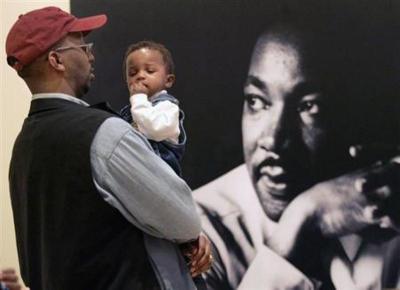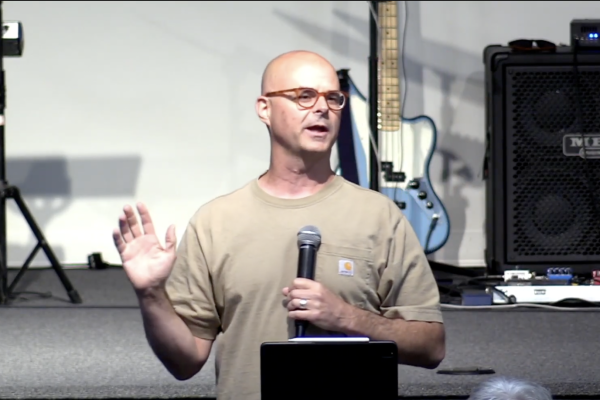Martin Luther King Jr. Day: A celebration of the arc of progressive redemption in America

Martin Luther King Jr. Day is unique among national holidays in that it honors the one American who profoundly described and demonstrated through love and non-violence a picture of the fulfillment of core values expressed in both the country’s founding Declaration of Independence in 1776 and in President Abraham Lincoln’s Gettysburg Address in 1863.
The Declaration’s self-evident truth “that all men are created equal, that they are endowed by their Creator with certain unalienable Rights, that among these are Life, Liberty, and the Pursuit of Happiness,” wasn’t realized when the U.S. Constitution was ratified some 14 years after the Declaration. Nor was Lincoln’s Gettysburg proposition “that all men are created equal” fulfilled through the Civil War’s Emancipation Proclamation that abolished slavery.
In King’s most famous “I Have A Dream” speech, delivered before the Lincoln Memorial in Washington, D.C. on August 28, 1963, it was as if the Almighty was calling America to rise up and fulfill its spiritual destiny. To the self-evident truth of all people having equal value, King added an equally timeless truth, that people "should not be judged by the color of their skin but by the content of their character."
MLK’s message took root because it was grounded in unassailable truth, establishing an ideal and absolute standard for an interracial society not only in America but for the entire world. Were it possible to transport King into the present, he would be deeply troubled by today’s identity politics, hatred, intolerance, and division.
King would condemn Critical Race Theory (CRT) on the simple grounds that its training perpetuates negative racial stereotypes albeit in a reversal that denigrates the white race. He would also find CRT fundamentally flawed because it exacerbates division in society rather than bringing people together and finding common ground through constructive dialogue and seeing all people as individuals made in God’s image. It is sad, but true that many of the proponents of CRT want to censor MLK, just as they have done with cancellation and tearing down statues of other earlier American heroes.
King was more than a great pastor and civil rights leader. He had a deep mind of discernment that focused on timeless truths, many of which speak to us today, such as Paul’s letter to the Romans, in which he said, “Do not conform to the pattern of the world, but be transformed in the renewing of your mind.” King drew on Thomas Jefferson’s statement, “I have sworn upon the alter of God eternal hostility against every form of tyranny over the mind of man.” King warned in a sermon as early as 1954, also recorded in his book, Strength to Love, that, “If Americans permit thought-control, business-control and freedom-control to continue, we shall surely move within the shadows of fascism.” Today—nearly seventy years later—we have moved way beyond shadows and now live in a matrix of fascism and communism that effectively operates at various levels within the United States under the camouflage and misnomer of being woke.
There have been few American leaders as strong and clearheaded about the dangers of groupthink than King. He reminds us of Emerson’s words, “Whoso would be a man must be a non-conformist.” And drawing on Apostle Paul’s teachings, King implored that, “Any Christian who blindly accepts the opinions of the majority and in fear and timidity follows a path of expediency and social approval is a mental and spiritual slave.” But he also saw the positive side of those who went against the crowd, pointing out that, “The trailblazers in human, academic, scientific, and religious freedom have always been nonconformists…[so] in any cause that concerns the progress of mankind, put your faith in the nonconformist!”
That so many brilliant non-conformists are being censored, canceled, and deplatformed today in America provides the clearest sign of regression and loss of the most essential freedom in America. One is reminded of Ben Franklin’s admonition that, “…there is no such thing as public liberty without free speech.”
King’s lesser-known speeches and sermons provide prescient insight into the times in which we live. On numerous occasions, King quoted scripture about the need to be “wise as serpents, and harmless as doves,” arguing that people need to have a tough mind and a tender heart. He expressed concern that the “prevalent tendency toward softmindedness is found in man’s unbelievable gullibility.” He further stated that “Few people have the toughness of mind to judge critically and to discern the truth from the false, the fact from the fiction…”
King was extremely critical of the media, stating that “One of the great needs of mankind is to be lifted above the morass of false propaganda.” He concluded this theme, with the warning that “a nation or a civilization that continues to produce soft-minded men purchases its own spiritual death on the installment plan.” Such counsel is dramatically more pertinent today than it was when he said it some 60 years ago.
If King were resurrected today, he would be shocked by the reversion that has taken place in America in the nearly three generations since he led the Civil Rights movement of the 1950s and 1960s. He would condemn the rise of hatred in politics, just as he would find the wholesale desensitization and detachment of young people troubling. He would also reject the eclipse of group, gender, and ethnic identity paradigm over the merit and character of the individual as the primary criteria for evaluation, acceptance, and advancement—whether in school admission or in the workplace.
Clearly, there is much to learn from and reflect on in the life of Martin Luther King. In closing, what is most significant and formidable about the man was the unique, vital, and powerful role he played in the unfinished progress of America. In spite of his flaws, he rose to the occasion of fulfilling the course of redemption in American history. Nearly 200 years after the vision expressed in the Declaration of Independence, and nearly 100 years after the bloody Civil War and Lincoln’s Emancipation Proclamation, Martin Luther King answered the call and ultimately sacrificed his life to finish the work he described as making people, “free at last, free at last.”
This article is a vignette out of the book, Rediscovering America.
Scott S. Powell is senior fellow at Discovery Institute. He has enjoyed a career split between theory and practice with 30 years of experience as an entrepreneur and rainmaker in several industries. He joined the Discovery Institute after having been a visiting fellow at Stanford’s Hoover Institution for six years and serving as a managing partner at a consulting firm, RemingtonRand. Reach him at scottp@discovery.org





















